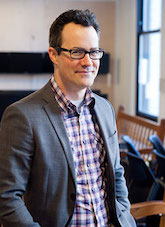As a child growing up in Toronto of the 1970s and 80s, Clive Thompson became fascinated with the first “home computers”—the ones you plugged into your TV, like the Commodore 64, and programmed using BASIC. He was hooked, spending hours writing video games, music programs, and simple forms of artificial intelligence. The obsession stuck with him, even as he went to the University of Toronto to study poetry and political science. When he became a magazine writer in the 1990s, the Internet erupted into the mainstream, and he began reporting on how digital tools—everything from email to digital photography to instant messaging—was changing society.
Clive started out pessimistic about the impact of the Internet on life. He worried, like many social critics before him, that society and civility would fall off a cliff. But over the next twenty years he realized that when everyday people were given remarkable powers of self-expression on a global scale, amazing things happened more often than not: Wikipedia, YouTube “response” conversations, collaborative art, crazy new forms of writing like TV recaps, collaborative problem-solving, and the ESP-like awareness that comes from the status-update universe.
Today, Thompson is one of the most prominent technology writers, respected for doing deeply-reported, long-form magazine stories that get beyond headlines and harness the insights of science, literature, history and philosophy. He specializes in writing not merely on the inventors of technologies, but about how everyday people use them—often quite unpredictably. In addition to the New York Times Magazine and Wired, he writes for Mother Jones and Smithsonian. He is one of the longest-running bloggers, having launched his science-and-tech blogCollision Detection since 2002. In his spare time he’s also a musician, performing in The Delorean Sisters and writing original music as part of the duo Cove. He is married and lives in Brooklyn with his two children.
Check out the following Psychology CE Courses based on listening to Shrink Rap Radio interviews:
Jungian Psychotherapy Part 1 (6 CEUs)
Jungian Psychotherapy Part 2 (7 CEUs)
Jungian Psychotherapy Part 3 (7 CEUs)
Jungian Psychotherapy Part 4 (6 CEUs)
Jungian Psychotherapy Part 5 (7 CEUs)
Jungian Psychotherapy Package of the Five Above (33 CEUs)
Wisdom of The Dream (4 CEUs)
Positive Psychology (6 CEUs)
Pros and Cons of Positive Psychology (5 CEUs)
The Fundamentals of Positive Psychology (6 CEUs)
CERTIFICATE PROGRAM IN POSITIVE PSYCHOLOGY (32 CEUs)
Body-Mind: Goodbye to Dualism (6 CEUs)
Brain: Insights from Neuroscience (8 CEUs)
Meditation & Psychotherapy (8 CEUs)
Crisis & Trauma: Identification, Assessment, & Treatment (15 CEUs)
Neuroscience and Healing (8 CEUs)
NEW! Holistic & Nutritional Approaches to Treating Psychological Disorders (5 CEUs)
NEW! Holistic Pyschotherapy: Treating The Whole Person (6 CEUs)
Get our iPhone/Android app!
Get 10% discount on all lectures at The JungPlatform using our discount code: DRDAVE
You can also earn CEU’s by going to another partner website at Ed4Online!
A psychology podcast by David Van Nuys, Ph.D.
copyright 2014: David Van Nuys, Ph.D.
Podcast: Play in new window | Download
Subscribe: Apple Podcasts | RSS
